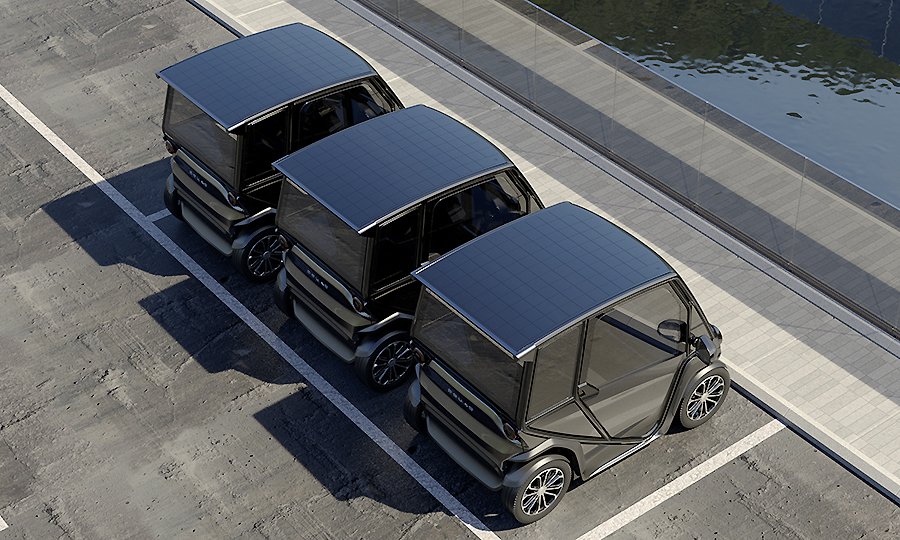<!–*/ */ /*–>*/
| Dutch startup pitches its two-seat solar EVs for car-sharing |

A Dutch startup is putting car-sharing in a new light.
The company, Squad Mobility, plans to roll out small battery-electric vehicles that it believes are well suited to car-sharing fleets and mobility as a service. The vehicles are equipped with rooftop solar panels to extend their range. The company says its goal is safe and accessible urban mobility.
The Squad Solar City car is a two-seater that runs on swappable batteries. The name Squad is short for solar quadricycle.
The company plans to launch the cars in Europe, then expand to the U.S. A prototype is expected to be unveiled in September 2022. Production is slated to begin in the last quarter of 2022.
The vehicle is about 4 feet wide, 5 feet tall and 6.7 feet long. Its small size allows for easy navigation and parking in cities. The company says three of the cars can fit comfortably in one parking space. The car has a top speed of 28 mph.
“Cities are looking for zero-emission mobility solutions with a small space footprint,” Squad Mobility CEO Robert Hoevers said in a press release. “A per capita energy consumption lower than public transport and a space footprint comparable to a bicycle. And all this while offering the flexibility of personal transport and the comfort of a car.”
The batteries provide 60 miles of range. Automatic solar charging extends that by up to 12.4 miles a day.
The tires of the vehicle act as protection bumpers. Sensors enable remote diagnosis of operating condition, charge levels, tire pressure, location and other features. The Squad will be equipped with cameras to check the state and position of the vehicle.
Squad Chief of Design Chris Klok said the long-term vision for the vehicle includes remote control using autonomous technology.
“Remote control means we take extra capabilities into account in the design, such as the application of remote actuation of the steering and the possibility to relay data,” Klok said.
– Wendy Guzman
What you need to know
Senate backs nonbinding measure calling for limits on EV tax credits The U.S. Senate voted 51-48 for a nonbinding amendment to President Joe Biden’s $3.5 trillion budget resolution aimed at limiting who can get a tax break for buying an electric car or truck and which vehicles qualify — potentially shaping the debate as Democrats prepare to expand the tax credit. Republican Sen. Deb Fischer of Nebraska proposed prohibiting people making more than $100,000 a year from claiming EV tax credits and ending tax credits for EVs that cost more than $40,000 — levels that would exclude many of the EVs on the market or planned to come to the market in the next few years, including those promoted by Biden recently at the White House.
Rivian in talks for $5 billion Texas plant Rivian Automotive Inc., the EV startup backed by Amazon Inc. and Ford Motor Co., is in talks to invest at least $5 billion to build a factory near Fort Worth, Texas, according to a document obtained by Bloomberg. The factory — code-named Project Tera, according to the document — will be able to produce 200,000 vehicles a year and will create at least 7,500 jobs by 2027. The presentation, made by the City of Fort Worth’s Economic Development Department to the City Council, also includes incentives including grants and county tax abatement of up to $440 million.
U.S. not ready for Honda’s Japan-only Level 3 system, exec says Honda started sales of the world’s first Level 3 self-driving vehicle in Japan in the spring, but don’t look for the system to arrive in the U.S. in the near future. The infrastructure here is not compatible with the Honda Sensing Elite system that enables hands-free driving in the 2021 Honda Legend sedan, said Jay Joseph, Honda vice president of marketing and customer experience, in a presentation at the Management Briefing Seminars last week. But also, the patchwork regulatory situation in individual states as well as insurance company policies and other issues are holding back deployment of the technology.
Roundup
Energy Secretary Granholm, touring GM EV plant, touts Biden goal.
Automotive, environmental trade groups join newly launched EV charging coalition.
Ford is preparing to inform Mustang Mach-E customers that the global semiconductor shortage will delay some deliveries at least six weeks.
Motional selects next big market for self-driving tests.
EO Charging, an electric-vehicle charging startup that powers Amazon’s delivery vans in the U.K., has agreed to merge with a U.S. blank-check firm and go public this year.
Daimler-backed car-sharing marketplace Turo Inc. confidentially filed paperwork Monday for a U.S. initial public offering.
Ford battery venture with SK Innovation will extend into Europe.
China’s tech crackdown thwarts U.S. listing plans for autonomous vehicle startup Pony.ai, report says.
Aichi Automobile Co., an electric-vehicle startup better known as Aiways, is exploring a U.S. initial public offering, sources tell Bloomberg.
ChargePoint has acquired Amsterdam’s ViriCiti, a provider of electrification solutions for eBus and commercial fleets.
Brain food
Tim Higgins’ new book, Power Play: Tesla, Elon Musk, and the Bet of the Century, offers good business lessons — and bad ones — for anyone involved in selling cars, says Automotive News Chief Content Officer Jamie Butters.
Last mile
Traditional suppliers gain ground in EV space.

